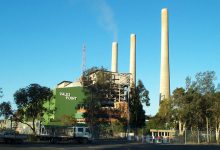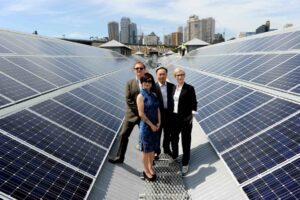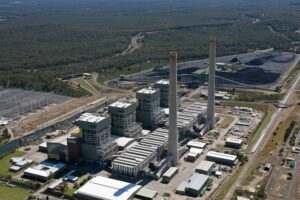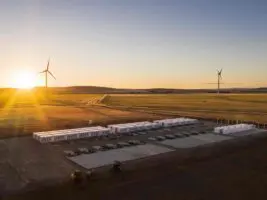The NSW Government is facing ‘unquantifiable’ liabilities for the decommissioning and rehabilitation of the Vales Point power station, documents released by the government have shown, with maximum of just $10 million recoverable from the new owners for works that will likely cost hundreds of millions.
Documents tabled by the NSW Government, in response to by an order of the NSW Legislative Council passed by the Greens NSW that compelled their release, and obtained by RenewEconomy have shown that the NSW Government is almost fully exposed to the costs of decommissioning and remediating the Vales Point power station.
In a deal that is now infamous throughout the energy sector, the NSW Government sold off the rights to operate the 1,320MW coal-fired Vales Point power station to Sunset Power, a consortium led by businessmen Trevor St Baker and Brian Flannery for just $1 million.
The documents show that at the time of the sale, the Vales Point power station was barely profitable, and the NSW Government was eager to offload the power station to avoid projected losses, and to reduce the government’s exposure to electricity price “volatility”.
The Government wrote down the value of the power station by $370 million in the months preceding the sale. Since then, however, the operators of Vales point have made windfall profits, and even lifted the value of the plant to $720 million.
The deal to sell off the rights to Vales Point was negotiated, and signed off, by then NSW treasurer, and now NSW Premier, Gladys Berejiklian. The deal was subsequently referred to the NSW Auditor General for review.
In selling the power station, the NSW Government estimated that it had managed to unload around $130 million in additional liabilities associated with Vales Point, mostly relating to staff entitlements.
“With the sale of Vales Point, NSW is no longer exposed to significant liabilities, such as costs associated with decommissioning, estimated to be in the tens of millions,” then Treasurer Gladys Berejiklian said at the time.
But documents have revealed that the these liabilities related to decommissioning of Vales Point that were offloaded as part of the sale were capped at just $10 million, with no allowance for the costs of remediation of the Vales Point site.
It therefore appears that the NSW Government is both still on the hook for substantial liabilities related to the clean up of the Vales Point site, and was successful in selling the power station at the absolute worst moment in the NSW energy market.
Making matters worse for the NSW Government is the guarantee they entered into to remediate the site, while allows the new owners to return the power station to leave the NSW Government will responsibility for organising the clean up of the Vales Point site once the power station is closed.
One of the documents obtained by RenewEconomy is a “Put and Call Option Deed” that will ensure that once Vales Point power station is closed, control of the plant will return back to NSW Government owned Delta Electricity.
Under the “Put and Call Option Deed”, dubbed the “handback deed”, Sunset Power is required to prepare a plan for the decommissioning of the power station once a decision is made to close Vales Point. Sunset Power is also responsible for completing the works necessary under this plan.
However, under a separate contract a cap has been placed on the financial liability placed on Sunset Power if it fails to adequately undertake the decommissioning works, limiting the amount of funds that can be recouped by the NSW Government if it is left responsible for the clean up of the Vales Point site.
These recoverable funds are capped at just $10 million, leaving the NSW Government exposed to the cost of an expensive site clean up, that could run into the hundreds of millions, if the closures of Hazelwood and Northern power stations in Victoria and South Australia are anything to go by.
“The maximum aggregate amount that may be recovered by [the NSW Government] from [the owners of Vales Point Power Station] in connection with Operating Period Contamination Guaranteed Obligations and Decommissioning Guaranteed Obligations is limited to the sum of $10,000,000.” the contract says.
The $10 million guarantee is unlikely to be anywhere near sufficient to cover the decommissioning and rehabilitation costs of the Vales Point power station. Costs for rehabilitation of the similarly sized Hazelwood power station exceeded $300 million. Rehabilitation of the Liddell power station is expected to be even higher, with Delta Electricity advising it expects costs to exceed $500 million.
“The Government has effectively sold off the income stream generated from the power station while leaving the public on the hook for potentially billions of dollars in rehabilitation and clean up.” Greens NSW MP Abigail Boyd said.
“This is just the latest giveaway to private investors – we now know that the State is also responsible for rehabilitation and clean up in relation to Eraring, Bayswater, Liddell and Colongra power stations.”
“The public deserves to know exactly how much it will cost to clean up the mess caused by decades of contamination in and around these power station sites.”
Concerns about the environmental impacts of contaimination, and materials collected at the Vales Point site have ready attracted criticism from legal group Environmental Justice Australia, labelling the owners of Vales Point “bad neighbours” for failures to adequately control pollution from coal ash.
““Delta’s actions at Vales Point have cemented its reputation as a bad neighbour with a lax approach to environmental regulations and a disregard for community health,” EJA researcher Dr James Whelan said.
It is evident that the NSW Government does not know the extent of the liability it is facing for the Vales Point decommissioning.
To this day, the NSW Government is still required to report in budget papers that it is exposed to a “non-quantifiable” liability for the remediation of the Vales Point power station site and lands upon the closure of Vales Point.

Sunset Power is indemnified from the costs of decontamination that relates to the operation of the Vales Point prior to its sale, the NSW Government will still be on the hook for that work.
But the major works will be the dismantling of the power station itself, and returning the site to reasonably close to its natural condition. These civil works drive up the costs of rehabilitation, and it won’t be until the planning of these works commence that the NSW Government is likely to know how much it will cost.
At the time of the sale in 2015, state-owned energy company Delta Electricity was selling electricity, including output from Vales Point, for $39.40 per MWh.
In the years subsequent to the sale, several developments led to a recovery in the fortunes of Vales Point. The repeal of the carbon price lifted a cost burden for all coal-fired generators, the closure of Hazelwood power station in Victoria and drought conditions across NSW saw supply in the electricity market increasingly constrained.
The NSW wholesale electricity price has surged beyond $80/MWh, making Vales Point highly profitable for its new owners, netting $113 million in net profit last year and has attracted a revised valuation for the plant of more than $720 million, rocketing St Baker into various Rich Lists.
Now, the owners are lobbying to have potential improvements to the operations of the plant eligible to receive money from the government’s controversial Emissions Reduction Fund, and it also has its hand out for grants under energy minister Angus Taylor’s Underwriting New Generation Investment program
The Sunset Power, the NSW Treasurer and the NSW Energy Minister have been contacted for comment.









